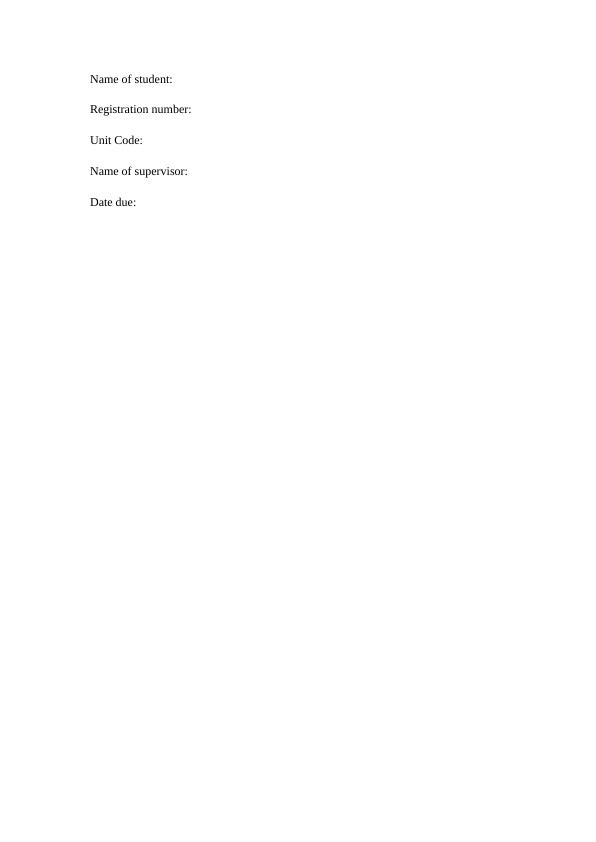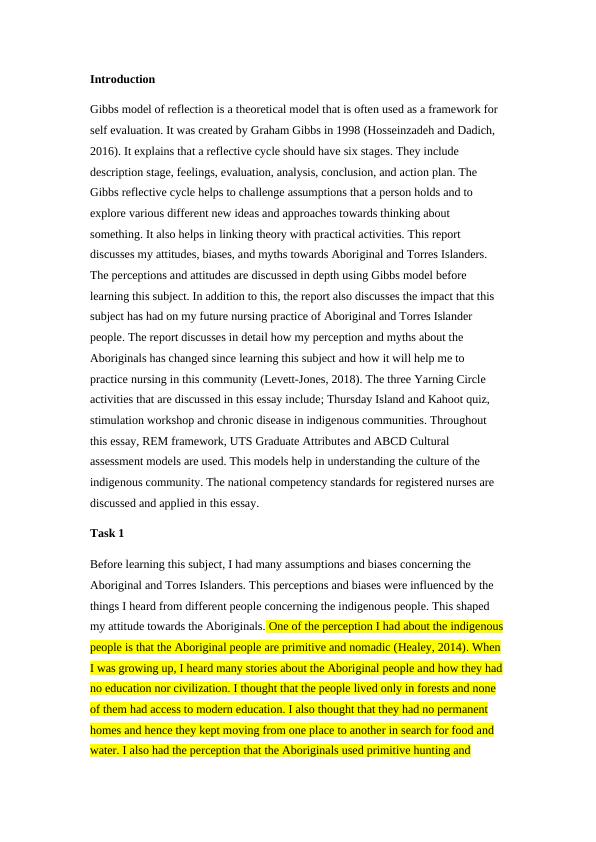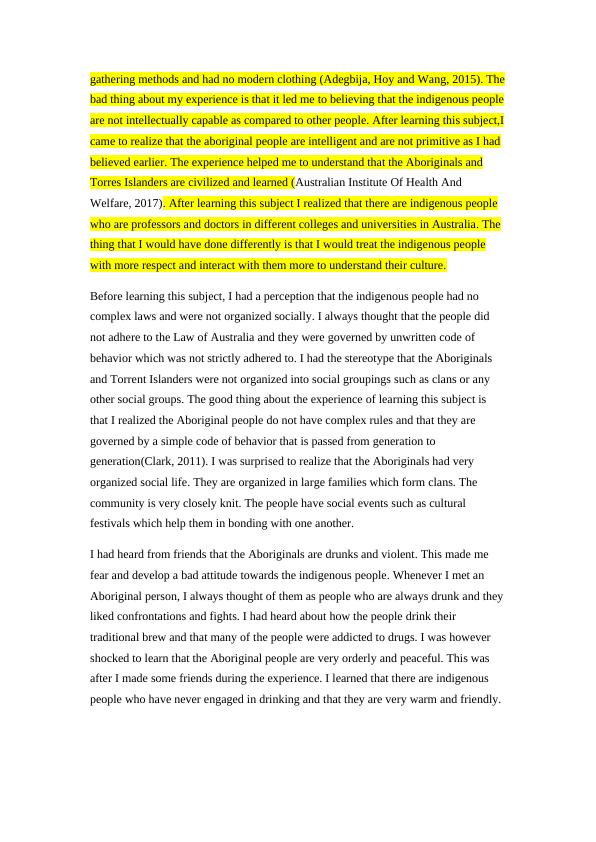Attitudes and Perceptions towards Aboriginal and Torres Islanders: A Reflection using Gibbs Model
Added on 2023-06-03
8 Pages2204 Words150 Views
Name of student:
Registration number:
Unit Code:
Name of supervisor:
Date due:
Registration number:
Unit Code:
Name of supervisor:
Date due:

Introduction
Gibbs model of reflection is a theoretical model that is often used as a framework for
self evaluation. It was created by Graham Gibbs in 1998 (Hosseinzadeh and Dadich,
2016). It explains that a reflective cycle should have six stages. They include
description stage, feelings, evaluation, analysis, conclusion, and action plan. The
Gibbs reflective cycle helps to challenge assumptions that a person holds and to
explore various different new ideas and approaches towards thinking about
something. It also helps in linking theory with practical activities. This report
discusses my attitudes, biases, and myths towards Aboriginal and Torres Islanders.
The perceptions and attitudes are discussed in depth using Gibbs model before
learning this subject. In addition to this, the report also discusses the impact that this
subject has had on my future nursing practice of Aboriginal and Torres Islander
people. The report discusses in detail how my perception and myths about the
Aboriginals has changed since learning this subject and how it will help me to
practice nursing in this community (Levett-Jones, 2018). The three Yarning Circle
activities that are discussed in this essay include; Thursday Island and Kahoot quiz,
stimulation workshop and chronic disease in indigenous communities. Throughout
this essay, REM framework, UTS Graduate Attributes and ABCD Cultural
assessment models are used. This models help in understanding the culture of the
indigenous community. The national competency standards for registered nurses are
discussed and applied in this essay.
Task 1
Before learning this subject, I had many assumptions and biases concerning the
Aboriginal and Torres Islanders. This perceptions and biases were influenced by the
things I heard from different people concerning the indigenous people. This shaped
my attitude towards the Aboriginals. One of the perception I had about the indigenous
people is that the Aboriginal people are primitive and nomadic (Healey, 2014). When
I was growing up, I heard many stories about the Aboriginal people and how they had
no education nor civilization. I thought that the people lived only in forests and none
of them had access to modern education. I also thought that they had no permanent
homes and hence they kept moving from one place to another in search for food and
water. I also had the perception that the Aboriginals used primitive hunting and
Gibbs model of reflection is a theoretical model that is often used as a framework for
self evaluation. It was created by Graham Gibbs in 1998 (Hosseinzadeh and Dadich,
2016). It explains that a reflective cycle should have six stages. They include
description stage, feelings, evaluation, analysis, conclusion, and action plan. The
Gibbs reflective cycle helps to challenge assumptions that a person holds and to
explore various different new ideas and approaches towards thinking about
something. It also helps in linking theory with practical activities. This report
discusses my attitudes, biases, and myths towards Aboriginal and Torres Islanders.
The perceptions and attitudes are discussed in depth using Gibbs model before
learning this subject. In addition to this, the report also discusses the impact that this
subject has had on my future nursing practice of Aboriginal and Torres Islander
people. The report discusses in detail how my perception and myths about the
Aboriginals has changed since learning this subject and how it will help me to
practice nursing in this community (Levett-Jones, 2018). The three Yarning Circle
activities that are discussed in this essay include; Thursday Island and Kahoot quiz,
stimulation workshop and chronic disease in indigenous communities. Throughout
this essay, REM framework, UTS Graduate Attributes and ABCD Cultural
assessment models are used. This models help in understanding the culture of the
indigenous community. The national competency standards for registered nurses are
discussed and applied in this essay.
Task 1
Before learning this subject, I had many assumptions and biases concerning the
Aboriginal and Torres Islanders. This perceptions and biases were influenced by the
things I heard from different people concerning the indigenous people. This shaped
my attitude towards the Aboriginals. One of the perception I had about the indigenous
people is that the Aboriginal people are primitive and nomadic (Healey, 2014). When
I was growing up, I heard many stories about the Aboriginal people and how they had
no education nor civilization. I thought that the people lived only in forests and none
of them had access to modern education. I also thought that they had no permanent
homes and hence they kept moving from one place to another in search for food and
water. I also had the perception that the Aboriginals used primitive hunting and

gathering methods and had no modern clothing (Adegbija, Hoy and Wang, 2015). The
bad thing about my experience is that it led me to believing that the indigenous people
are not intellectually capable as compared to other people. After learning this subject,I
came to realize that the aboriginal people are intelligent and are not primitive as I had
believed earlier. The experience helped me to understand that the Aboriginals and
Torres Islanders are civilized and learned (Australian Institute Of Health And
Welfare, 2017). After learning this subject I realized that there are indigenous people
who are professors and doctors in different colleges and universities in Australia. The
thing that I would have done differently is that I would treat the indigenous people
with more respect and interact with them more to understand their culture.
Before learning this subject, I had a perception that the indigenous people had no
complex laws and were not organized socially. I always thought that the people did
not adhere to the Law of Australia and they were governed by unwritten code of
behavior which was not strictly adhered to. I had the stereotype that the Aboriginals
and Torrent Islanders were not organized into social groupings such as clans or any
other social groups. The good thing about the experience of learning this subject is
that I realized the Aboriginal people do not have complex rules and that they are
governed by a simple code of behavior that is passed from generation to
generation(Clark, 2011). I was surprised to realize that the Aboriginals had very
organized social life. They are organized in large families which form clans. The
community is very closely knit. The people have social events such as cultural
festivals which help them in bonding with one another.
I had heard from friends that the Aboriginals are drunks and violent. This made me
fear and develop a bad attitude towards the indigenous people. Whenever I met an
Aboriginal person, I always thought of them as people who are always drunk and they
liked confrontations and fights. I had heard about how the people drink their
traditional brew and that many of the people were addicted to drugs. I was however
shocked to learn that the Aboriginal people are very orderly and peaceful. This was
after I made some friends during the experience. I learned that there are indigenous
people who have never engaged in drinking and that they are very warm and friendly.
bad thing about my experience is that it led me to believing that the indigenous people
are not intellectually capable as compared to other people. After learning this subject,I
came to realize that the aboriginal people are intelligent and are not primitive as I had
believed earlier. The experience helped me to understand that the Aboriginals and
Torres Islanders are civilized and learned (Australian Institute Of Health And
Welfare, 2017). After learning this subject I realized that there are indigenous people
who are professors and doctors in different colleges and universities in Australia. The
thing that I would have done differently is that I would treat the indigenous people
with more respect and interact with them more to understand their culture.
Before learning this subject, I had a perception that the indigenous people had no
complex laws and were not organized socially. I always thought that the people did
not adhere to the Law of Australia and they were governed by unwritten code of
behavior which was not strictly adhered to. I had the stereotype that the Aboriginals
and Torrent Islanders were not organized into social groupings such as clans or any
other social groups. The good thing about the experience of learning this subject is
that I realized the Aboriginal people do not have complex rules and that they are
governed by a simple code of behavior that is passed from generation to
generation(Clark, 2011). I was surprised to realize that the Aboriginals had very
organized social life. They are organized in large families which form clans. The
community is very closely knit. The people have social events such as cultural
festivals which help them in bonding with one another.
I had heard from friends that the Aboriginals are drunks and violent. This made me
fear and develop a bad attitude towards the indigenous people. Whenever I met an
Aboriginal person, I always thought of them as people who are always drunk and they
liked confrontations and fights. I had heard about how the people drink their
traditional brew and that many of the people were addicted to drugs. I was however
shocked to learn that the Aboriginal people are very orderly and peaceful. This was
after I made some friends during the experience. I learned that there are indigenous
people who have never engaged in drinking and that they are very warm and friendly.

End of preview
Want to access all the pages? Upload your documents or become a member.
Related Documents
Aboriginal and Torres Strait Islander's People Studylg...
|9
|2090
|157
Nursing and Health Inequality among Aboriginal and Torres Strait Islander People in Australialg...
|8
|1944
|316
Self-Reflection on Indigenous People of Australia: Gibbs Six Step Modellg...
|9
|2146
|451
principles-of-logistics-management-assignmentlg...
|8
|2089
|806
Nursing Reflective Essay using Gibbs Modellg...
|5
|986
|346
Reflection on my own attitude and impact on Aboriginal and Torres Strait Islander on my nursing practiceslg...
|8
|2002
|205
